人教版八年级英语下册Unit1语法与知识点
人教版初二(下)英语unit1 what's the matter知识点讲解与练习

八年级下册英语Unit 1 what’s the matter?词汇篇学生通过本讲学习,能够掌握本单元的重点词汇句型,并在综合能力上有一定的拓展。
1.matter的用法(1)名词:事情,问题What’s the matter? =what’s wrong (with you)? =what’s the trouble怎么啦?出什么事啦?(2)动词:有重大影响,有重要性如:What does it matter?2.疾病的表达法have a cold/a fever/ a toothache/ a stomachache3.take 的固定搭配take one’s temperature/ take breaks/ take risks/take some medicine/take off/ take care of/take away 4.surprise的用法1.做名词:to one’s surprise 使。
惊讶的,出乎。
意料2.做动词:surprise sb使某人吃惊3.做形容词:surprising, surprised的用法5.get的用法get off下车/get on上车/get into陷入,参与6.be used to sth/doing sth 习惯于做某事be used to do sth 被用作去做某事used to do sth 习惯于做某事7.out of的固定搭配look out of 向。
外看/ get out of从。
出来/ run out of用光基础演练1.---What’s wrong ______you?---I fell off the bike and hurt my leg.A. ofB. withC. forD. by2.Tom and Jenny enjoyed _________playing computer games.A. himselfB. herselfC. ourselvesD. themselves3. Sally became interested ___________science and wanted to be a scientist.A. forB. inC. throughD. at4. ---I had a __________.---You’d better go to see a dentist.A. headacheB. feverC. coldD. toothache5. I didn’t _________my temperature, but I knew I had a fever.A. giveB. setC. takeD. show二、根据汉语意思翻译句子。
人教版英语八年级下册Unit 1-5 单元语法知识梳理
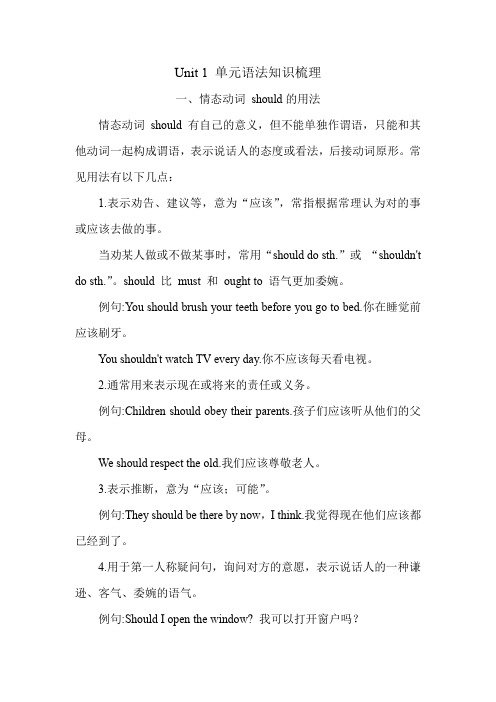
Unit 1 单元语法知识梳理一、情态动词should的用法情态动词should有自己的意义,但不能单独作谓语,只能和其他动词一起构成谓语,表示说话人的态度或看法,后接动词原形。
常见用法有以下几点:1.表示劝告、建议等,意为“应该”,常指根据常理认为对的事或应该去做的事。
当劝某人做或不做某事时,常用“should do sth.”或“shouldn't do sth.”。
should 比must 和ought to 语气更加委婉。
例句:You should brush your teeth before you go to bed.你在睡觉前应该刷牙。
You shouldn't watch TV every day.你不应该每天看电视。
2.通常用来表示现在或将来的责任或义务。
例句:Children should obey their parents.孩子们应该听从他们的父母。
We should respect the old.我们应该尊敬老人。
3.表示推断,意为“应该;可能”。
例句:They should be there by now,I think.我觉得现在他们应该都已经到了。
4.用于第一人称疑问句,询问对方的意愿,表示说话人的一种谦逊、客气、委婉的语气。
例句:Should I open the window? 我可以打开窗户吗?What should we do now? 我们现在该干什么呢?5.表示某种感情色彩,意为“竟会”,常用于以how, why开头引导的特殊疑问句中。
例句:Why should you be so early today? 你今天为什么会如此早?二、反身代词1.反身代词的构成反身代词是一种表示反射或强调的代词。
它由第一人称、第二人称的形容词性物主代词和第三人称代词的宾格加词尾-self或-selves构成。
其构成如下表:反身代词与它所指代的名词或代词形成互指关系,两者在人称和数上应保持一致。
初中英语人教版八年级下册重点语法详解( Unit 1-6)

八年级英语下册重点语法详解Unit 1Irene Irene中英文天地 2023-03-16 12:19 发表于广东1.have / get / catch a(n)+疾病名称,表示患某种疾病。
e.g.I have / get / catch a cold.我感冒了。
【拓展】have a bad cold 重感冒have a fever 发烧have a headache 头痛have a stomachache 肚子痛, 胃痛have a toothache 牙痛have a backache 背痛2.lie down 躺下e.g.You had better lie down and have a rest.你最好躺下休息。
3.have a rest = take a rest = rest 休息have a break=have breaks=take a break=take breaks (课间)休息4.away from 离开……;与……有一定的距离(与不同动词搭配,意思会受上下文影响)e.g.They live away from us.他们住的地方离我们远。
5.see sb.doing sth.看见某人正在做某事e.g.When I pass the window I see him drawing a picture.当我经过窗户时,看到他正在画画。
see sb.do sth.看见某人做过某事e.g.I often see him draw pictures.我经常看到他在画画。
6.think twice 认真思考,权衡利弊e.g.We must think twice before we make this decision.我们在做决定之前应该权衡利弊。
7.to one’s surprise 使……惊讶的是,出乎……意料e.g.To their surprise, all the students pass the exam.令他们惊讶的是,所有学生都通过考试了。
最新人教版八年级下册英语第一单元知识点
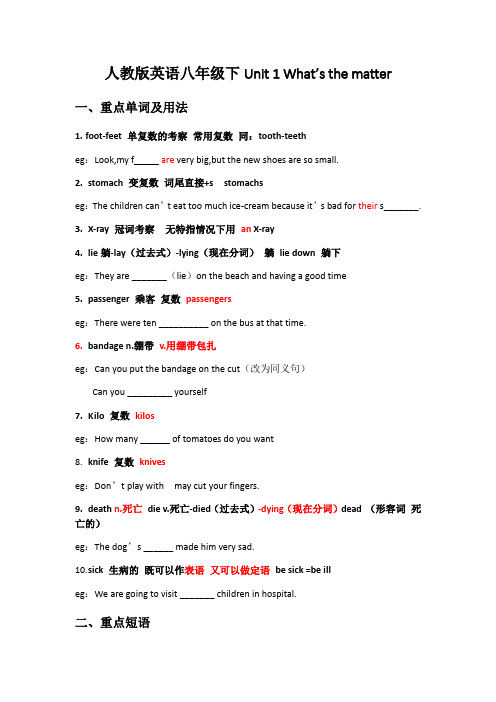
人教版英语八年级下Unit 1 What’s the matter一、重点单词及用法1.foot-feet 单复数的考察常用复数同:tooth-teetheg:Look,my f_____ are very big,but the new shoes are so small.2.stomach 变复数词尾直接+s stomachseg:The children can’t eat too much ice-cream because it’s bad for their s_______.3.X-ray 冠词考察无特指情况下用an X-ray4.lie躺-lay(过去式)-lying(现在分词)躺lie down 躺下eg:They are _______(lie)on the beach and having a good time5.passenger 乘客复数passengerseg:There were ten __________ on the bus at that time.6.bandage n.绷带v.用绷带包扎eg:Can you put the bandage on the cut(改为同义句)Can you _________ yourself7.Kilo 复数kiloseg:How many ______ of tomatoes do you want8.knife 复数kniveseg:Don’t play with may cut your fingers.9.death n.死亡die v.死亡-died(过去式)-dying(现在分词)dead (形容词死亡的)eg:The dog’s ______ made him very sad.10.s ick 生病的既可以作表语又可以做定语be sick =be illeg:We are going to visit _______ children in hospital.二、重点短语have a cold =catch a cold =have the flu 感冒cough 咳嗽lie down 躺下take one’s temperature 量体温have a fever 发烧take/have breaks/a break 休息=take/have a rest get off 下车-get on上车to one’s surprise 令某人惊讶的是right away 立刻马上=right now get into (trouble)陷入(麻烦)get sunburned 被晒伤be used to (doing)习惯于适应于...... take risks/a risk 去冒险run out (of)用完用尽cut off 切除get out of 离开从......出来be in control of 掌管管理give up (doing)放弃(做)某事have a stomachache 胃痛get an X-ray 做一个X射线检查thanks to......由于多亏in time 及时on time 准时think about 考虑think of认为fall down 摔倒make a decision 作决定put......on......把....放在...上be interested in 对...感兴趣三、用法总结1.need to do sth需要做某事eg: The teacher needs_____(rest) for a few minutes.like 意为“听起来像”后接n./adj./句子eg: It sounds like a good idea.类似的感官动词+like:feel like/smell like/ look like/taste like/seem likesound+adj. 结构中,sound 是系动词意为“听起来是”后接形容词eg:That sounds great.+n./doing(v.现在分词)He went to school without having breakfast. eg:He left the classroom without ________ anythingv.同意,赞成agree with sb/某人的意见看法Does she agree with usagree to do sth 同意做某事They agreed to solve the problem. problems (in) doing sth做某事有困难=have trouble/difficulty (in) doinghave problems with sth =have trouble/difficulty with sth 在某方面有困难eg:One of my good friends said he had problems__________(learn) English.get used to doing sth 习惯于做某事eg:He used to get up late,but now he is used to getting up early.used to do sth 过去常常做某事(现在不做了)eg:He used to read English in the evening.use sth to do sth 使用用某物做某事eg:So he used knife to cut off his arm.be used to do sth 被动被用于做某事eg:These new pens are used to paint the wall.one’s life 丧失生命save one’s life 挽救某人的生命eg:He lost his life in the car accident.adj.足够的充足的后接名词n. enough moneyadv.足够地修饰形容词/副词enough要后置eg:The book is_______,but I don’t have enough money ______it.interesting; to buy enough; to buyenough; buying interesting; buying9. the importance of (doing)sth (做)某事的重要性important adj.重要的unimportant adj.不重要的importance n.重要性eg:We students should know the importance of (learning)English.n.决定make a decision (to do sth)decide to do sth 决定做某事decide not to do sth 决定不做某事eg:Tom made a decision to study English well.up 放弃give up 是动词+副词结构接代词作宾语时代词放中间eg:The problem is so difficult for you,but don’t _______A.give it up it out up it out itgive up doing sth 放弃做某事eg:You will be very sad if you give up______(sing).用法keep on doing sth 继续做某事(中间有间隔强调重复性)eg:He kept on studying though he was very tired.keep doing sth 继续不停地做某事(不间断连续性)eg:Keep walking until you reach the end of the road.keep sb doing 让某人一直做某事eg:Don’t keep the other students waiting.keep sb from doing sth 阻止某人做某事eg:We should keep the little boy from stepping on the grass.用法find找到,强调寻找的结果look for强调寻找过程find out找出查明eg:I was looking for my watch,but I didn’t find it.find sb doing sth 发现某人正在做某事eg:When I walked along the road,I found an old man shouting for help.find it +adj形容词+to do sth 发现做某事是...的eg:She found it hard to finish the work by herself.risks=take a risk 冒险He likes taking risks.risk one’s life to do 冒着生命危险去做某事eg:He risked his life to save the child.risk doing stheg: The man called Tom often risks flying over the sea.四、短语辨析1.see sb doing sth 看见某人正在做某事(动作正在发生)see sb do sth 看见某人做某事(看到动作全过程或者经常看到动作发生)eg:I saw the boy crying when I passed by(路过).类似的hear/watch/notice/find+sb do/doing sththanks to 多亏... 由于....=with the help of/with one’s help=because ofthanks for 因.......而感谢强调感谢的原因eg:Thanks to my teacher ,I passed the exam.Thanks for your help .Thanks for inviting me.2.in time 及时表示动作在规定时间内或比规定时间提前发生on time 准时按时指正好在规定时间内eg:Thanks for coming here to help me in time.The train arrived into the station on time.火车准时进站了。
Unit1语法知识点梳理人教版英语八年级下册

人教版八年级英语下册语法知识点Unit1. What’s the matter?▶短语归纳1.have a cold 感冒2. have a stomachache 胃痛3. have a headache 头痛4. have a sore throat 喉咙痛5. have a fever 发烧6. have a cough 咳嗽7. have a heart problem 有心脏病8.hurt oneself伤到自己9.cut oneself割伤自己10.fall down 摔倒;跌倒11.get hit/sunburned 被击中/晒伤12. lie down 躺下13. take breaks/take a break 休息14. go to a/the doctor 看医生15.see a dentist 看牙医16. get an Xray 拍个X光片17. take one's temperature 量体温18. put some medicine on...在…上敷些药19.take sb. to the hospital带某人去医院20. take risks/take arisk冒险21.lose one’s life 失去生命22.run out(of)用尽;耗尽23.cut off 切除24.away from 远离25. make a decision /make decisions 做决定26.sound like 听起来好像27.get out of离开;从………出来28. get off 下车29. get to 到达30.get into 陷人;参与31.wait for 等待32.think twice 慎重考虑,再三考虑33.think about 考虑34. go mountain climbing 去爬山35. give up 放弃36. tell of叙述;描述37. the importance of……的重要性38. be interested in 对……感兴趣39. be in control of掌管;管理40.to one ’s surprise 使某人惊讶的是; 出乎某人的意料 41.thanks to 多亏;由于 42.in time 及时43.right away=at once 立即;马上 44. because of 因为 45.by oneself 独自;单独 46. too much 太多 47.a few 一些48.all weekend 整个周末 49. so that 以便▶用法集萃sth.需要某物1. needto do sth.需要做某事doing sth.某事需要被做2. see sb ..doing sth.看见某人正在做某事 do sth.看见某人做了某事3.mean to do sth.打算做某事 doing sth.意味着做某事4. expect/want (sb. ) to do sth 期待(某人)做某事/想要(某人)做某事 6. seem(to be)+形容词 好像……seem to do sth.好像做某事 seem + that 从句 好像.…7. agree/happen to do sth. 同意做某事/碰巧做某事 8.help sb.(to)do sth. 帮助某人做某事9.tell sb.(not)to do sth. 告诉某人(不要)做某事10.have problems(in)doing sth. 做某事有困难11. use sth. to do sth.= use sth. for doing sth.用某物做某事12. give up/ keep on doing sth. 放弃做某事/继续做某事13.mind doing sth.介意做某事14.so+形容词/副词+that从句15.It is/was+形容词+ that 从句如此……以至于…"某事是…▶语法专项一.询问某人的健康问题及遇到麻烦时的常用表达1.询问某人患了何种疾病或遇到了何种麻烦时,常用以下几种结构来表达: What's the matter (with sb.)?(某人)怎么了?What's wrong (with sb.)?(某人)怎么了?What's the trouble ( with sb.)?/ (某人)出什么事了?What happened (to sb.)?(某人)发生什么事了?Are you OK?你没事吧?Is there anything wrong( with sb. )?(某人)有什么事吗?2.要表达身体某一部位疼痛或不舒服,可用以下结构:(1)某人+have/has+病症The twins have colds.这对双胞胎感冒。
人教版英语八年级下册知识点

Unit 1 What’s the matter?一、重点短语1. have a fever 发烧2. have a cough 咳嗽3. have a toothache 牙疼4. have a sore back 背疼5. have a sore throat 喉咙痛6.have a cold 受凉;感冒7. have a nosebleed 流鼻血8.have a heart problem 有心脏病9.have a stomachache 胃疼10.have problems breathing 呼吸困难11. talk too much 说得太多12. drink enough water 喝足够的水13. lie down and rest 躺下来休息14. hot tea with honey 加蜂蜜的热茶15. see a dentist 看牙医16. get an X-ray 拍X 光片17. take one’s temperature 量体温18. feel very hot 感到很热19. go along 沿着……走20. go to a doctor 看医生21. get off/on 下车/上车22. get into trouble 造成麻烦23. get into/out of 进入/从……出来24. be in control (of) 掌管;管理25.be out of control(of)失控26. thanks to 多亏了27. on the side of the road 在马路边28. shout for help 大声呼救29. put some medicine on sth. 在…上面敷药30. all weekend 整个周末31.put a bandage on sth. 用绷带包扎32. hurt oneself 受伤33. to one’s surprise 使....... 惊讶的34.fall down 摔倒35. without thinking twice 没有多想36. save a life 挽救生命37. put her head back 把她的头向后仰38. cut his knee 割伤他的膝盖39. be used to doing sth. 习惯做某事40. used to do过去常常41. in the same way 以同样的方式42. sound like 听起来像43. make a decision 做出决定44. because of 由于45. mountain climbing 登山运动46. feel sick 感到恶心47. in a difficult situation 在困境中48. take risks 冒险49. keep on doing sth. 继续做某事50. give up (doing) sth. 放弃51. run out (of) 用完;用尽52. in time 及时on time准时53. right away/at once 立刻54. so that 以便二、重点语法1.What’s th e matter(with sb)?怎么了?询问麻烦事或身体状况=What’s the trouble (with sb)?=What’s the problem (with sb)?=What’s up?=What’s your trouble/problem?2.1.) have a+名词,表示某种病have a cough咳嗽2.)sore也可表疾病have a sore back/throat背疼/喉咙痛3. need有两种词性,实义动词和情态动词实义动词:1. need sth 2. need (sb) to do 3. don’t need.....情态动词:1. need+原型2. Need I ....? 肯Yes,you must. 否No, you needn’t.4.see sb do sth看见某人做某事(强调全过程)see sb doing sth看见某人正在做某事(强调正在发生)5.expect sth期待某物agree with sb同意某人expect(sb) to do 期待做某事agree to do同意做某事expect+that从句期待agree+that从句6.have trouble/problems in doing sth 做某事有困难7.trouble用法:1).be in trouble处于困境2).get(sb) into trouble(使某人)陷入困境8.词组辨析:used to do过去常常be used to doing习惯于做9.so...that+从句如此...以至于so that为了,目的是引导目的状语从句(当主句主语与从句主语一致时可用in order to)Eg: He works hard so that he can succeed=He works hard in order to succeed.10.What’s the meaning of...?=What does...mean?....的意思是什么?11.反身代词:myself, yourself, himself, herself, itself, ourselves, yourselves, themselvesteach oneself,enjoy oneself,dress oneself,introduce oneself,help oneself12.躺:lie-lay-lain-lying 说谎:lie-lied-lied-lying下蛋:lay-laid-laid-laying(规则的撒谎,不规则的躺,躺过就下蛋)Unit 2 I ’ll help to clean up the city parks.一、重点短语1. Clean-Up Day 清洁日2. an old people’s home 养老院3. help out with sth. 帮助解决困难4. used to do sth.过去常常做某事5. care for 关心;照顾6. the look of joy 快乐的表情7. at the age of 在......岁时8. clean up 打扫(或清除)干净9. cheer up (使)变得更高兴;振奋10. give out 分发;散发11. come up with 想出;提出12. make a plan 制订计划13. make some notices 做些公告牌14. try out 试用;试行15. work for 为…工作;为…. 效力16. put up 建造;举起;张贴17. hand out 分发;散发;发给18. call up 打电话;召集19. put off 推迟;延迟20. for example 比如;例如21. raise money 筹钱;募捐22. take after 与......相像;像23. give away 赠送;捐赠24. fix up 修理;修补;解决25. be similar to 与……相似26. set up 建立;设立27. disabled people 残疾人28. make a difference 影响;有作用29. be able to 能够30. after-school reading program课外阅读项目31.a feeling of satisfaction满足感32.several hours若干小时33.volunteer to do自愿做34.sick kids生病的孩子35.homeless people无家可归的人36.be busy with sth忙于37.disabled people残疾人38.a trained dog一只受过训的狗39.book lover爱书者40.think up想出二、重点语法1. notice sb do sth注意到某人做过某事,notice sb doing sth注意到某人正在做某事3.satisfaction用法:1.)satisfy v. satisfy sb 使某人满意2.)satisfied/satisfying adj. be satisfied with对...满意3.)satisfaction n. to one’s satisfaction令某人满意4.owner用法:1.)the owner of...的主人the owner of the shop 2.)one’s own+名词my own shop5. sick adj. 定语,表语sickness n.ill adj. 表语illness n. He is ill.=He is sick. Here is a sick dog.5.raise 及物动词rise 不及物动词The sun rises. Raise your hands.6.take after像(品质,外貌)look like像(外貌)7.imagine+动名词/名词/代词imagine sb doing8.have trouble/problems/difficulty in doing做某事有困难He has trouble in learning English.9.形容词+ness变名词:kind-kindness,ill-illness,sick- sickness, sad-sadness,happy-happiness,busy-business,fair-fairness10.句型辨析:It is clever/smart/kind/nice/friendly of sb to 某人做某事是...的It is +adj+for sb to do 做某事对某人来说是...的11.change one’s mind改变主意change green into yellow由绿变黄12.be interested in=have an interest in 对...感兴趣Unit 3 Could you please clean your room?一、重点短语1.go out for dinner 出去吃饭2. stay out late 在外面待到很晚3. go to the movies 看电影4. take sb. for a walk 带某人去散步5.all day/evening 整曰/夜6.do housework 做家务7. get a ride 搭车8. work on 从事9. finish doing sth. 完成做某事10. clean and tidy 干净整洁11. do the dishes 洗餐具12. take out the rubbish 倒垃圾13. fold the clothes 叠衣服14. sweep the floor 扫地15. make the bed 整理床铺16. as a result结果17. help out 帮忙18. get good grades取得好成绩19. throw down 扔下20.as soon as=the minute 一...就...21. come over 过来22.shout back 大声回应23.walk away 走开24.all the time 一直;总是25.share the housework 分担家务26. a comfortable home 一个舒适的家27.in surprise 惊讶地28. get something to drink 拿点喝的东西29.hang out 闲逛30. watch one show 观看一个节目31. pass sb. sth. 把某物传给某人32. lend sb. sth. 把某物借给某人33. get sth. wet 使某物弄湿34. hate to do sth. 讨厌做某事35. do chores 做杂务36. help sb. (to ) do /with sth 帮助某人干某事37.bring a tent带顶帐篷来38. buy some snacks买些小吃39. go to the store去商店40. invite sb. to a party邀请某人参加聚会41. make sb. do sth. 使某人做某事42. enough stress足够的压力43.a waste of time浪费时间44. in order to为了45. provide sb with sth=provide sth for sb46. mind doing sth. 介意做某事47. depend on依赖;依靠48. look after/take care of 照顾;照看49. develop children’s independence发展孩子的独立性50. do one’s part in (doing ) sth.做某人分内的事51. come home from school/ work放学/下班回家二、重点语法1.Could you please(not) do sth ?用于提出请求,希望得到对方肯定回答,语气较委婉。
八年级英语下册Unit1What’sthematter短语语法知识点汇总(新版)人教新目标版

Unit 1 What’s the matter一、必背短语Section A 部分have a cold have a stomachachehave a sore throat have a sore backlie down and rest take one’s temperaturetalk too much take breaks/a breakget off get an X-ray11.看见某人正在做.. see sb. doing think twiceexpect sb. to do 14.使…惊讶的to one’s surpriseagree to do sth. in time17.多亏,由于thanks to 18.陷入困境;惹麻烦get into troubleSection B 部分rest for a few days …放下;低下p ut…downtell sb. to do tell sb. not to dohave problems/trouble/difficulty (in) doing sth…感兴趣be interested in be used to doing sthused to do sth take risks/a risk10.由于/因为+n./pron. because of in a dangerous situationin a difficult13.用尽,耗光run out (of)situationbe ready to do cut off…以至于…s o…that…17.以便于;为了so that/in order that【教材内容解析】Section A1.What’s the matter? (P. 1)What’s the matter意为“怎么了?出什么事了?”,常用来询问对方遇到什么麻烦或者有什么不顺心的事,后接with sb./sth.表示“某人/某物怎么了”。
英语八年级下册m1知识点

英语八年级下册m1知识点英语八年级下册M1是说英语八年级下册的第一模块,这个模块主要是讲述了一些重要的知识点,在这里我们来一一了解一下。
一、动词时态动词时态是英语语言中非常重要的一部分,我们必须掌握好它。
动词时态包括:现在时、过去时和将来时。
现在时表示现在正在发生的事情,过去时表示已经发生了的事情,将来时表示将要发生的事情。
二、被动语态被动语态是一个非常常用的语法形式,它用于表示动作的承受者。
例如:这本书被我借走了。
在这个句子中,“这本书”是承受者,“我”是动作的执行者。
三、宾语从句宾语从句是一个包含在宾语中的子句,它常常作为主句的宾语。
例如:我知道他在做什么。
在这个句子中,“他在做什么”是宾语从句。
四、状语从句状语从句是一个包含在句子中的子句,它通常用来修饰句子中的动词,形容词或者副词。
例如:当我见到他时,他正在做功课。
在这个句子中,“当我见到他时”是状语从句。
五、比较级和最高级比较级和最高级是英语中用来比较两个或多个事物差异的基本形式。
比较级表示两个事物之间的大小或者差异,最高级用来表示三个或多个事物之间的大小或者差异。
六、情态动词情态动词是一组特殊的助动词,它们与其它动词搭配使用,用来表达肯定、否定、建议、请求、可能性、能力等。
例如:我可以帮助你。
在这个句子中,“可以”就是一个情态动词。
以上就是英语八年级下册M1的知识点总结。
我们如果掌握了这些语法规则,就能更好地学习英语,更好地理解和应用英语。
人教版新版八年级英语下册Unit1 知识要点
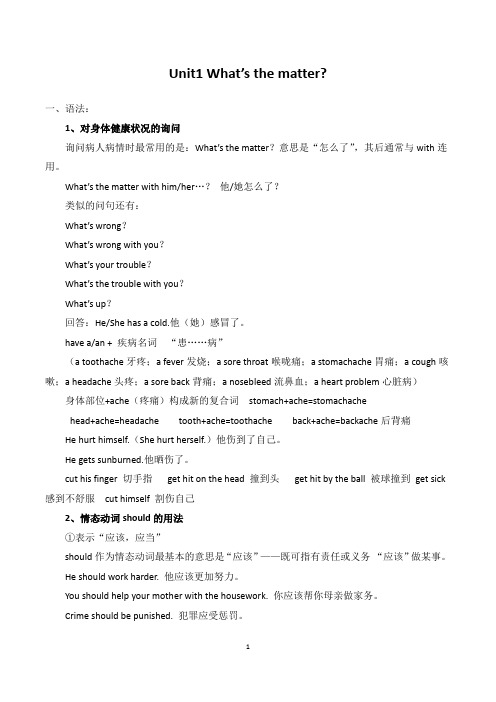
Unit1 What’s the matter?一、语法:1、对身体健康状况的询问询问病人病情时最常用的是:What’s the matter?意思是“怎么了”,其后通常与with连用。
What’s the matter with him/her…?他/她怎么了?类似的问句还有:What’s wrong?What’s wrong with you?What’s your trouble?What’s the trouble with you?What’s up?回答:He/She has a cold.他(她)感冒了。
have a/an + 疾病名词“患……病”(a toothache牙疼;a fever发烧;a sore throat喉咙痛;a stomachache胃痛;a cough咳嗽;a headache头疼;a sore back背痛;a nosebleed流鼻血;a heart problem心脏病)身体部位+ache(疼痛)构成新的复合词stomach+ache=stomachachehead+ache=headache tooth+ache=toothache back+ache=backache后背痛He hurt himself.(She hurt herself.)他伤到了自己。
He gets sunburned.他晒伤了。
cut his finger 切手指get hit on the head 撞到头get hit by the ball 被球撞到get sick 感到不舒服cut himself 割伤自己2、情态动词should的用法①表示“应该,应当”should作为情态动词最基本的意思是“应该”——既可指有责任或义务“应该”做某事。
He should work harder. 他应该更加努力。
You should help your mother with the housework. 你应该帮你母亲做家务。
人教版八年级下册英语Unit1知识点语法归纳总结

⼈教版⼋年级下册英语Unit1知识点语法归纳总结Unit 1 What’s the matter?1.短语归纳2.典句必背3.⽤法集萃(1)当别⼈⼼情不好,⾝体不适或遇到⿇烦时,我们可以⽤如下表达表⽰关⼼:?What’s the matter? What’s the matter with youWhat’s wrong with …What’s the trouble\problem with …(2)英语中常⽤have描述⾝体的不适,此时have意为“患有”,常⽤结构:①have a + 疾病例:have a cold 感冒;have a fever 发烧;have a cough 咳嗽②have a + ⾝体部位-ache例:have a headache 头痛;have a toothache ⽛痛③have a sore + ⾝体部位例:have a sore throat 咽喉痛;have a sore back 背痛(3)lie down躺下;tell lies/a lie 说谎(4)maybe & may be①maybe,“或许”,常⽤于句⾸,表⽰可能性,后加句⼦。
例:Maybe you are right.②may be,是情态动词+be的结构,意为“可能,也许”,后加名词、代词或形容词。
例:He may be angry.(5)sound like & sound①sound like+名词/代词/从句例:It sounds like you don’t know the truth. It sounds like a good idea.②sound+形容词,“听起来,好像”,例:The music sounds nice.(6)…when the driver saw an old man lying on the side of the road. ……这时司机看到意为⽼⼈躺在路边。
人教版八年级英语下册单词-短语-句型和语法总结

⼈教版⼋年级英语下册单词-短语-句型和语法总结Unit1What’s the matter?【重点单词】matter [?m?t?] v.重要,要紧,有关系What’s the matter? 怎么了?出什么事了?sore [s?:(r)] adj. 疼痛的,酸痛的have a cold感冒stomach ['st?m?k]n. 胃,腹部stomachache ['st?m?ke?k] n.胃痛,腹痛have a stomachache 胃痛foot(复数feet) [fu:t] n. 脚neck [nek] n.颈,脖⼦throat[θr??t] n.喉咙fever ['fi:v?]n. 发烧,发热lie [la?]v. 躺,平躺lie down躺下rest [rest] n. 剩余部分,其余;放松,休息cough [k?f] n. & v.咳嗽X-ray ['eksre?] n.X光,X射线toothache[?tu:θe?k] n. ⽛痛takeone's temperature 量体温headache [?hede?k] n.头痛have a fever发烧break [bre?k] n. &v. 休息,暂停;打破take breaks (take a break) 休息hurt [h?:t] v.伤害,损害,使受伤passenger ['p?s?nd??]n. 乘客,旅客off[?f] adv. prep.离开(某处);从…去掉get off 下车to one's surprise 使…惊讶,出乎…意料onto [??nt?]prep. 向,朝trouble[?tr?bl] n. ⿇烦,烦扰,问题hit [hit] n. & v.碰撞,打,打击right away ⽴即,马上get into陷⼊,参与herself [h?:?self]pron.她⾃⼰,她本⾝(she的反⾝代词)bandage ['b?nd?d?]n.& v. 绷带;⽤绷带包扎sick [s?k] adj.患病的,不适的knee [ni:] n.膝盖nosebleed [?n??zbli:d]n. ⿐出⾎breathe [bri:e] v.呼吸sunburned[?s?nb?:nd] adj. 晒伤的ourselves[ɑ:?selvz] pron. 我们⾃⼰(we的反⾝代词)climber [?kla?m?(r)] n. 登⼭者be used to 习惯于… 适应于…risk[r?sk] n. &v. 风险,危险;冒险take risks (take a risk)冒险accident [??ksid?nt] n. 意外事件;事故situation [?sitju?ei??n] n. 状况,形式,情况kg=kilogram[?k?l?gr?m]n.公⽄,千克rock[r?k] n. 岩⽯run out (of) ⽤尽,耗尽knife [naif] n.⼑,餐⼑cut off 切除blood [bl?d] n. ⾎mean [mi:n] v. 意味着,意思是,意欲get out of离开,从… 出来importance [?m?p?:tns] n. 重要性decision [d?'s??n] n. 决⼼,决定,抉择control [k?n'tr??l] v.控制,⽀配,操纵be in control of 掌管,管理spirit['sp?r?t] n.勇⽓,意志death [deθ] n.死亡give up放弃nurse [n?:s]n. 护⼠【重点短语】1.have a fever 发烧2.havea cough咳嗽3.have atoothache⽛疼4.talk too much 说得太多5.drink enoughwater喝⾜够的⽔6.have a cold 受凉;感冒7.have a stomachache胃疼8.have asore back背疼9.have a sore throat喉咙痛10. take risks冒险11.hot teawith honey加蜂蜜的热茶12.see a dentist 看⽛医13.get an X-ray 拍X 光⽚14.takeone’ s temperature量体温15.putsomemedicine onsth. 在……上⾯敷药16.give up 放弃17. sound like听起来像18.all weekend 整个周末19. in the same way 以同样的⽅式20. go to a doctor 看医⽣21. goalong沿着……⾛22. on thesideofthe road 在马路边23. shout for help⼤声呼救24. without thinking twice没有多想25. get off 下车26. have a heart problem 有⼼脏病27. toone’ s surprise另某⼈惊讶的是28.thanksto 多亏了;由于29. in time 及时30.makea decision 做出决定31. get into trouble造成⿇烦32.right away⽴刻;马上33. becauseof由于34. getout of 离开;从……出来35. keep on doing sth. 继续或坚持做某事36.put abandage on sth. ⽤绷带包扎37.fall down 摔倒38. feel sick 感到恶⼼39. have a nosebleed流⿐⾎40.cuthis knee割伤他的膝盖41. put her head back把她的头向后仰42.have problems breathing 呼吸困难43. mountain climbing登⼭运动44. be used to doing sth.习惯做某事45. run out(of) ⽤完;⽤尽46. so that 以便47. so...that... 如此……以⾄于...…48. be in control of 掌管;管理49. in a difficult situation 在闲境中【重点句型】1. What's the matter with you?=What'the trouble with you?= What's wrong with you? 你怎么了?2. What should she do? 她该怎么办呢?3.Should I take my temperature?我应该量⼀下体温吗?4.You should lie down and rest.你应该躺下休息⼀会⼉。
人教版英语八年级下册Unit 1 第一单元语法复习

第一单元语法复习1. 情态动词should的用法(1)情态动词should意为“应该”,后跟动词原形,表示责任和义务。
变为一般疑问句时将should提前,变为否定句时在should后面加not。
其结构为:主语+should/shouldn't(shouldn't =should not不应该)+动词原形。
如:①You should lie down and rest.你应该躺下休息。
②He shouldn't go to school when he has a cold.他感冒时不应该去上学。
( 2 ) should 常用于以下两种情况:①提出建议、观点或看法。
You look tired.You should lie down and rest.你看起来很疲惫,你应该躺下休息。
②表示推测,意为“应该,按理应当”。
Wait a minute. I think he should come in a moment.请稍等一下,我想他应该马上过来。
【拓展】在英语中,表示建议的说法有很多,而且都是中考观察的重点。
主要结构有:①Would you like (to do) sth . ?你想要/愿意(做)某事吗?Would you like to play basketball with me?你想要和我一起打篮球吗?②Shall l/we do sth ?我/我们做,,好吗?Shall we go to the zoo tomorrow?明天我们去动物园,好吗?③Why not do sth ? 为什么不,,呢?Why not join us?为什么不加入到我们中间来呢?④How/What about doing sth ?做某事怎么样?How about going swimming?去游泳怎么样?⑤Let’s do sth让我们做,,吧。
Let ' s go home .我们回家吧。
Unit1词汇,短语,语法归纳人教版八年级英语下册

八下 unit 1 语法归纳总结询问某人的健康问题及遇到事情麻烦等常用的表达方式1 What's the matter (with xx)?(某人)怎么了?2 What's wrong (with xx)?(某人)怎么了?3 What's the trouble (with xx)?(某人)怎么了?4 What happened (to xx)?(某人)发生了什么事?5 Are you OK? 你没事吧?6 Is there anything wrong with xx? 某人有什么事吗?练一练: What's the matter with your leg? ﹦________ ________ ________ ________ __________?﹦________ ________ ________ ________ __________?表达身体疼痛或不舒服,可用如下结构1. sb + have/ has + 病症Eg: Sb has/ have a cold/ bad cold/ cough/ fever/ temperature/ nosebleed某人有感冒,重感冒,咳嗽,发烧,出鼻血2.sb + has/have + a + 身体部位 + acheEg: Sb has/have a headache / toothache/ earache/ backache/ heartache/ stomachache 某人头痛,牙痛,耳朵疼,后背痛,心痛,胃痛3. sb + has/ have + a sore +发病部位Eg: Sb has/have a sore throat/ eye/ back/ arm某人嗓子疼,眼睛疼,后背疼,胳膊疼4. sb + has/have a pain (pains) in one's + 身体部位Eg:Sb has/have a pain in sb's head/ neck 某人头痛,脖子痛5. sb的某部位 + hurt(hurts)注:hurt的过去式,过去分词还是hurteg: My head hurts. 我头痛 His legs hurts。
Unit 1 八年级英语下册语法知识归纳(人教版)(解析版)

Unit 1 What’s the matter?一.Have的用法归纳总结①have的基本含义意为“拥有”,“具有”,第三人称单数为has。
e.g. I have three brothers but Linda doesn’t have brothers or sisters.②have可表示“吃,喝,玩,做”等常见的动作,这时其为实义动词。
e.g. have a good day 玩的开心have breakfast/lunch/dinner 吃早/中/晚餐Have a rest 休息③have 表示“患病”,第三人称单数为hase.g. I have a cold.I have to look after my sister because she has a stomachache.二.情态动词should的用法①should意为“应该”,表示责任或义务,可用于各种人称。
e.g.We should protect the environment. 我们应该保护环境。
Be supposed to 意为“被期望,本应”,后+动词原形,相当于情态动词shoulde.g. We are supposed to study hard.= We should study hard.②should表示推测,指有一定根据的推测,常译为“按道理说应该”。
e.g. She left hours ago. She should be home now. 她几小时前就离开了,按道理说现在应该在家。
③should表示说话人的惊奇,愤怒,失望等特殊情感。
e.g. He is always the first,but he should be late this morning.他总是第一个到,但今天早晨他竟然迟到了。
④should表示提供帮助、建议、或要求对方给出意见。
e.g. What should she do?She should take her temperature.I think you’d better lie down and rest.三.反身代词的用法(Reflexive pronouns)①反身代词的形式:表示动作回执到其执行者本身,用以加强语气,意为“我(们)自己、你(们)自己,他/她/它(们)自己”的代词称为反身代词。
人教版八年级下册英语第一单元unit1知识点
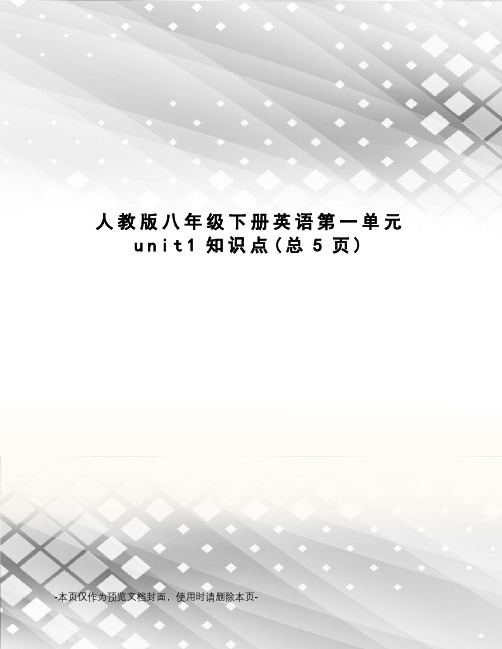
人教版八年级下册英语第一单元u n i t1知识点(总5页)-本页仅作为预览文档封面,使用时请删除本页-Unit 1 Will people have robots★语法知识归纳一、概念:表示将来某个时间要发生的动作或存在的状态,也表示将来经常或反复发生的动作,常与表示将来的时间状语连用,如tomorrow, next week, next year等。
I will go back to my hometown next week.We will come to see you every Sunday.二、构成1.肯定式:主语+will/shall/be going to +动词原形+其他will:shall:be going to:○They’ll have a test next week.○Shall we have a rest?○I’m going to write a letter to my friend.2.否定式:在will/shall/be后面加notwill+not= shall+not= is+not= are+not=将上面三个肯定句变为否定句○○○3.一般疑问句:将will/shall/be提到主语之前。
将○、○句变为一般疑问句○○★重点句子讲解you think there will be robots in pe ople’s homes?(1)本句是一个_________句,think后面接_________从句,从句的语序必须是_________语序。
引导词_______________________.(2)there will be是there be 句型的一般将来式,否定形式为___________________.一般疑问句形式是 _____________________. be going to 形式为______________________________.翻译:今晚将有一场电影。
人教版八年级下册各单元英语语法解析知识重点总结
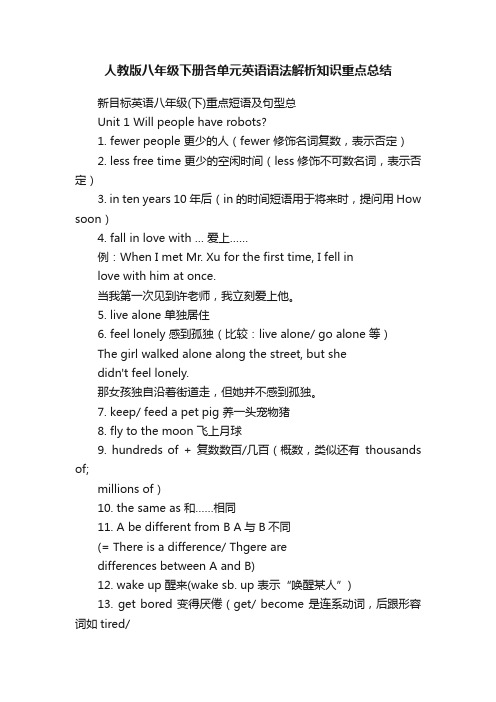
人教版八年级下册各单元英语语法解析知识重点总结新目标英语八年级(下)重点短语及句型总Unit 1 Will people have robots?1. fewer people 更少的人(fewer 修饰名词复数,表示否定)2. less free time 更少的空闲时间(less 修饰不可数名词,表示否定)3. in ten years 10年后(in 的时间短语用于将来时,提问用How soon)4. fall in love with … 爱上……例:When I met Mr. Xu for the first time, I fell inlove with him at once.当我第一次见到许老师,我立刻爱上他。
5. live alone 单独居住6. feel lonely 感到孤独(比较:live alone/ go alone 等)The girl walked alone along the street, but shedidn't feel lonely.那女孩独自沿着街道走,但她并不感到孤独。
7. keep/ feed a pet pig 养一头宠物猪8. fly to the moon 飞上月球9. hundreds of + 复数数百/几百(概数,类似还有thousands of;millions of)10. the same as 和……相同11. A be different from B A与B不同(= There is a difference/ Thgere aredifferences between A and B)12. wake up 醒来(wake sb. up 表示“唤醒某人”)13. get bored 变得厌倦(get/ become 是连系动词,后跟形容词如tired/angry/ excited 等)14. go skating 去滑冰(类似还有go hiking/ fishing /skating/ bike riding 等)15. lots of/ a lot of 许多(修饰可数名词、不可数名词都可以)16. at the weekends 在周末17. study at home on computers 在家通过电脑学习18. agree with sb. 同意某人(的意见)19. I don't agree. = I disagree. 我不同意。
人教版八年级下册英语Unit1单元语法知识点总结

人教版八年级下册英语Unit 1单元语法知识点总结本单元重点短语的具体用法1. have a fever/cough/toothache/cold:表示患有某种疾病或不适,例如:- I have a fever and a cough. 我发烧并咳嗽。
- She has a toothache and needs to see a dentist. 她牙疼,需要看牙医。
- I caught a cold and had to stay in bed. 我感冒了,不得不卧床休息。
2. see a dentist:看牙医,例如:- If you have a toothache, you should see a dentist. 如果你牙疼,应该去看牙医。
3. get an X-ray:拍 X 光片,例如:- The doctor suggested that I get an X-ray to check my lungs. 医生建议我拍个 X 光片检查肺部。
4. take one's temperature:量体温,例如:- The nurse took my temperature to see if I had a fever. 护士给我量了体温,看我是否发烧。
5. lie down:躺下来,例如:- You should lie down and rest if you feel sick. 如果你感觉不舒服,应该躺下来休息。
6. take breaks:休息,例如:- It's important to take breaks and relax during the day. 在一天中休息和放松很重要。
7. in the same way:以同样的方式,例如:- We solved the problem in the same way as the teacher showed us. 我们用老师教我们的同样方式解决了问题。
人教版英语八年级下册 单词 短语 语法
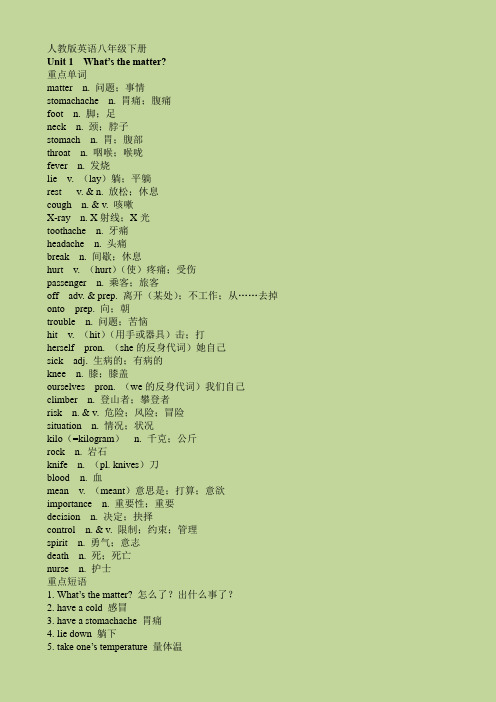
人教版英语八年级下册Unit 1What’s the matter?重点单词matter n. 问题;事情stomachache n. 胃痛;腹痛foot n. 脚;足neck n. 颈;脖子stomach n. 胃;腹部throat n. 咽喉;喉咙fever n. 发烧lie v. (lay)躺;平躺rest v. & n. 放松;休息cough n. & v. 咳嗽X-ray n. X射线;X光toothache n. 牙痛headache n. 头痛break n. 间歇;休息hurt v. (hurt)(使)疼痛;受伤passenger n. 乘客;旅客off adv. & prep. 离开(某处);不工作;从……去掉onto prep. 向;朝trouble n. 问题;苦恼hit v. (hit)(用手或器具)击;打herself pron. (she的反身代词)她自己sick adj. 生病的;有病的knee n. 膝;膝盖ourselves pron. (we的反身代词)我们自己climber n. 登山者;攀登者risk n. & v. 危险;风险;冒险situation n. 情况;状况kilo(=kilogram)n. 千克;公斤rock n. 岩石knife n. (pl. knives)刀blood n. 血mean v. (meant)意思是;打算;意欲importance n. 重要性;重要decision n. 决定;抉择control n. & v. 限制;约束;管理spirit n. 勇气;意志death n. 死;死亡nurse n. 护士重点短语1. What’s the matt er? 怎么了?出什么事了?2. have a cold 感冒3. have a stomachache 胃痛4. lie down 躺下5. take one’s temperature 量体温6. have a fever 发烧7. take breaks(take a break)休息8. get off 下车9. to one’s surprise 使……惊讶的;出乎……意料10. right away 立即;马上11. get into 陷入;参与12. be used to 习惯于……;适应于……13. take risks(take a risk) 冒险14. run out (of) 用尽;耗尽15. cut off 切除16. get out of 离开;从……出来17. be in control of 掌管;管理18. give up 放弃重点句型1. —What’s the matter?—I have a stomachache.2. —W hat’s the matter with Ben?—He hurt himself. He has a sore back.3. —Do you have a fever?—Yes, I do. / No, I don’t./I don’t know.4. —Does he have a toothache?—Yes, he does.5. —What should she do?—She should take her temperature.6. —Should I put some medicine on it?—Yes, you should. / No, you shouldn’t.7. You shouldn’t eat so much next time.He should lie down and rest.He should see a dentist and get X-ray.重点语法1. have在涉及健康问题的句子中的应用。
- 1、下载文档前请自行甄别文档内容的完整性,平台不提供额外的编辑、内容补充、找答案等附加服务。
- 2、"仅部分预览"的文档,不可在线预览部分如存在完整性等问题,可反馈申请退款(可完整预览的文档不适用该条件!)。
- 3、如文档侵犯您的权益,请联系客服反馈,我们会尽快为您处理(人工客服工作时间:9:00-18:30)。
---It ’s too cold. Should I close the window? 太冷了,我该关上窗户吗? ---Yes, you ______./No, you ________. 是的,你应该。 / 不,你不应该。
2.should 的用法 用法 表示劝告、建议
例句 You _________ answer the questi开心。
做介词的宾语
常 用 于 in,on,with,of,after,by She lives by _________ in
做同位语
作宾语 强调作用、加强语气
the countryside. 她一个人生活在乡下。 Did you make the
cake
_________?
.
精品文档
为加强语气,也常翻译为“亲自” 、“自己”。不定人称代词 one-----oneself.
1、反身代词的分类 数、人称
第一人称
第二人称
第三人称
单数
myself
yourself
Himself,herself,itself
复数
ourselves
yourselves
themselves
2、反身代词的用法
Section A
1. What ’s the matter? 怎么了? 该句常用询问某人患了何种疾病或遇到了什么麻烦,其后用
with 引出对象。
1). What ’s the matter with sb.? =what ’s wrong with sb.?
=what ’s the trouble/problem with sb.? =what ’s one’s trouble/problem?
用法
说明
例句
作动词的宾语
常用于 enjoy,teach,hurt,buy, He is teaching _________
introduce,dress,help,
English.
look after, get dressed 作宾语 他在自学英语。
We enjoyed _________ last
精品文档
一、
Unit 1 第一部分: Grammar 情态动词( Modal Verbs )
情态动词 should 意为“应该,应当” ,必须和后面的动词原形一起构成谓语,没有人称 和数的变化。用以表达职责和义务、提出劝告,而且表述的是自己的主观看法。
1.should 的句式结构 句式 肯定句
结构 主语 +should+do
你应该用英语回答这个问题。
表示推测 表示惊讶、赞叹、不满等
They _________ be at home now, I think. 我认为,他们现在应该在家。
How _________ I know it? 我怎么知道这间事情
呢?
注意: should 在以 why, who, how 等疑问词开头的问句中,意为“竟然,居然,怎么会” , 表示意外、惊喜或在说话人看来是不可思议的。
e.g. What ’s the matter with Tom?=what ’s _________ with Tom? =What ’s the _________ with Tom?=What ’s Tom’s _________?
2). matter, 名词,“问题,事情” e.g. We have important _________(matter) to discuss. 我们有些重要的问题要讨论。
3). 动词,“要紧,关系重大” e.g. It dosen’t _________ that you came late.
.
精品文档
2. I have a cold.我感冒了。 1).have/get/catch a cold “感冒,着凉 ”
The old man _________ a cold yesterday.那位老人昨天感冒了。 2). “have +a/an +疾病名称 ”意为“得了 ….病” have a fever, have a cough,have a headache…
二、 其他表示建议的句型
用法
例句
Shall we/I + do+ …?
Shall we _________ for a walk? 咱们去散步好 吗?
What/How about+doing/sth …?
What about _________ swimming? 去游泳怎么 样?
Let’s + do…?
Let’s _________ and _________ them. 咱们去看 看他们吧。
You’d/We ’d better (not) + do …?
We _________ _________ wait a little longer. 我们最好再稍等一会儿。
Why don ’t you + do …?
这蛋糕是你亲自做的嘛?
Mr. Black _________ is a
lawyer.
布莱克先生本人就是一名律
师。
做表语
强调“自己”
Just be _________. 做你自己
就好了。
Mary hasn’t quite been
_________ recently. 玛丽最近 有些不对劲。
第二部分:单词用法
例句 They should eat a balaced diet. 他们应该平衡饮食。
否定句
主语 +should not +do
They shouldn ’t eat too much.
他们不该吃得太多。
一般疑问句
---Should + 主语 +do+…? ---yes, 主语 +should. ---No, 主语 +shouldn ’t.
Why don ’t you _________ a walk outside? 为什么不出去散步呢?
Why not + do …? 三、 反身代词
Why _________ _________ a walk outside? 为什么不出去散步呢?
表示反射或强调的代词叫做反身代词。 反身代词是由第一人称、 第二人称形容词性物主代词 或第三人称代词的宾格形式,词尾加 self 或 selves 组成。反身代词可译“本人” 、“本身”,
